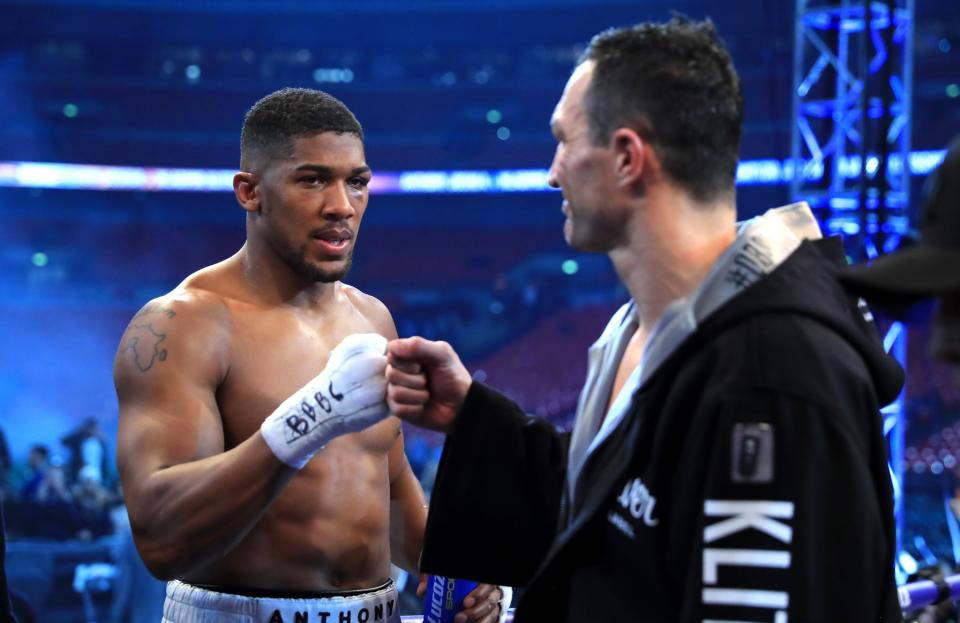A rare bit of boxing sanity opens the door for an Anthony Joshua-Wladimir Klitschko rematch
For all of the good things that have occurred in boxing in 2017 – the massive television rating for the Keith Thurman-Danny Garcia fight; the 90,000 crowd at Wembley Stadium for the Anthony Joshua-Wladimir Klitschko fight; the signing of a hotly anticipated middleweight title match between Gennady Golovkin and Canelo Alvarez; and the one million pay-per-view buys sold for the Alvarez-Julio Cesar Chavez Jr. bout, among others – an old nemesis has been hanging around.
The threat of mandatory title matches being enforced has threatened matches fans really wanted to see.
But in a rare bit of sanity, the International Boxing Federation relented Wednesday on forcing Joshua to defend his heavyweight belt against Kubrat Pulev. This opens the door for a rematch of the incredible heavyweight title fight between Joshua and Klitschko sometime later this year.
That fight was everything that is good about boxing, and deserves to be repeated. The fighters, who stand to make millions of dollars, deserve it. So, too, do the fans, as well as promoter Eddie Hearn, who did a fantastic job putting together and staging Joshua-Klitschko I.
On the surface, mandatory title matches appear necessary and in the best interest of fans. No one wants the champion sitting on the belt and avoiding the best opposition.
But because the divisional ratings of boxing’s four major sanctioning bodies are so poor, and the organizations don’t rate another’s champions, it is often the opposite.
Pulev is one of the better heavyweights in the world, and is 25-1 with 13 knockouts. His only defeat was a fifth-round knockout loss to Klitschko in 2014.
But no one could honestly say they’d rather see Pulev fight Joshua for the belt rather than see Joshua rematch Klitschko. Pulev didn’t exactly earn his title shot, either, beating George Arias, Maurice Harris, Dereck Chisora, Samuel Peter and Kevin Johnson since losing to Klitschko.
The fight most fans want to see in the heavyweight division, if not a Joshua-Klitschko rematch, would be one between Joshua and WBC champion Deontay Wilder.
It would pit Wilder, the charismatic, power-punching American who is 38-0 with 37 KOs, against Joshua, the charismatic, power-punching Briton, who is 19-0 with 19 knockouts for the IBF, WBA and WBC titles.
That would be a massive spectacle.
It’s not even in discussion, though, because of the ridiculous mandatory rules. The WBC has ruled that Wilder must defend against Bermane Stiverne, whom he defeated in Las Vegas in 2015 to win the belt.
Stiverne is, much like Pulev, a decent fighter, but hardly a great. But giving him the mandatory eliminates the possibility for the time being of Joshua-Wilder.
Thus far, 2017 has been a remarkably good year for boxing, and one of the underrated good things that has occurred has been signs of common sense from the sanctioning bodies.
All four of them have a history of playing favorites, manipulating the rankings, doing favors for close associates and preventing super fights from occurring.
The WBA, which along with the WBC are the two oldest and longest recognized bodies, makes matters worse by having multiple champions in many divisions. It has a designation it refers to as super champion, which means a fighter only has to make a mandatory every 18 months instead of every 12 months. What it really is, however, is a way for the WBA to squeeze more sanctioning fees out of a fighter.
A sanction fee is a percentage of the purse a boxer must pay to the organization for the privilege of competing for that body’s title. It’s usually in the three percent range, though it can be negotiated for extremely high purses.
But the WBA has two champions at cruiserweight, two at light heavyweight, two at middleweight, three at super welterweight, two at welterweight, three at featherweight, three at super bantamweight and two at bantamweight. In eight of the 17 divisions, the WBA has two or more champions.

It literally is the kind of thing that ruins boxing. In March, Gennady Golovkin defeated Daniel Jacobs in a heavily hyped bout to retain the IBF and WBC belts and to win the WBA belt. But on the following Monday, a WBA middleweight title fight between Ryota Murata and Hassan N’Dam was announced.
One almost has to spend his or her life following these series of arcane moves to understand why there are two or more champions in eight of the WBA’s 17 classes and how we’ll ever get to a spot where the fights the fans most want to see are regularly made.
That’s why the IBF’s decision to greenlight a rematch between Joshua and Klitschko is so significant. It makes a bout that will have exceptional public interest far simpler to complete and will make certain the stakes are just as high as they were for the first.
Often, fighters who have won two or more belts drop one of them to make it easier to defend the title. Otherwise, the fighter will be doing nothing but mandatories.
The IBF acted in the best interests of the sport, the boxers and the fans, and should be applauded for it.
The heads of the four sanctioning bodies – WBA president Gilberto Mendoza Jr., WBC president Mauricio Sulaiman, IBF president Daryl Peoples, and WBO president Francisco Valcarcel – need to understand that what is good for boxing is good for them.
Title unification bouts should always be encouraged. Rematches of competitive fights that were critical and financial successes should be allowed.
That’s what is happening in the Joshua-Klitschko case, and that’s why it’s yet another great day for boxing.


